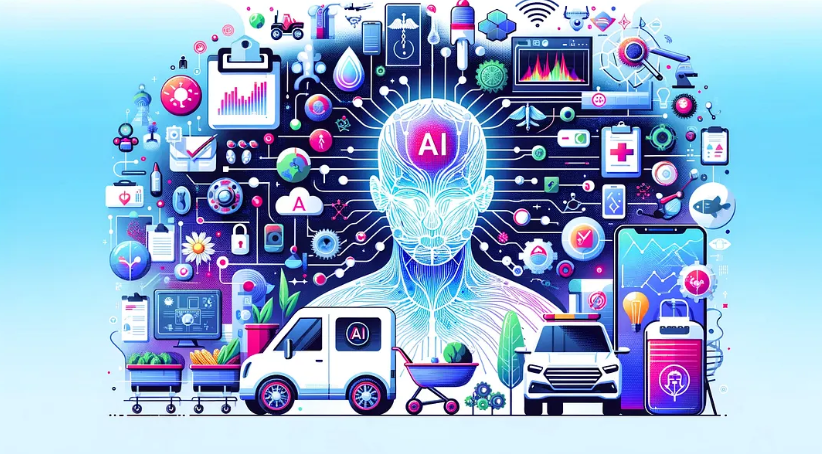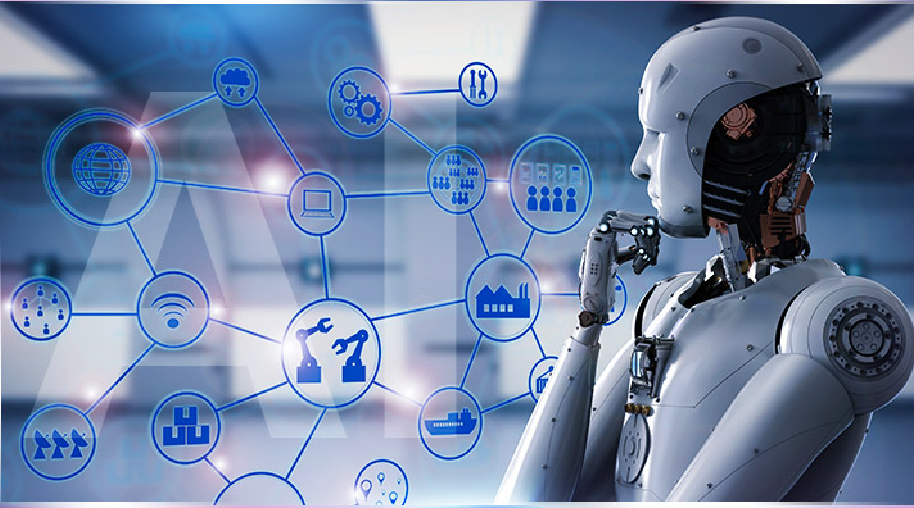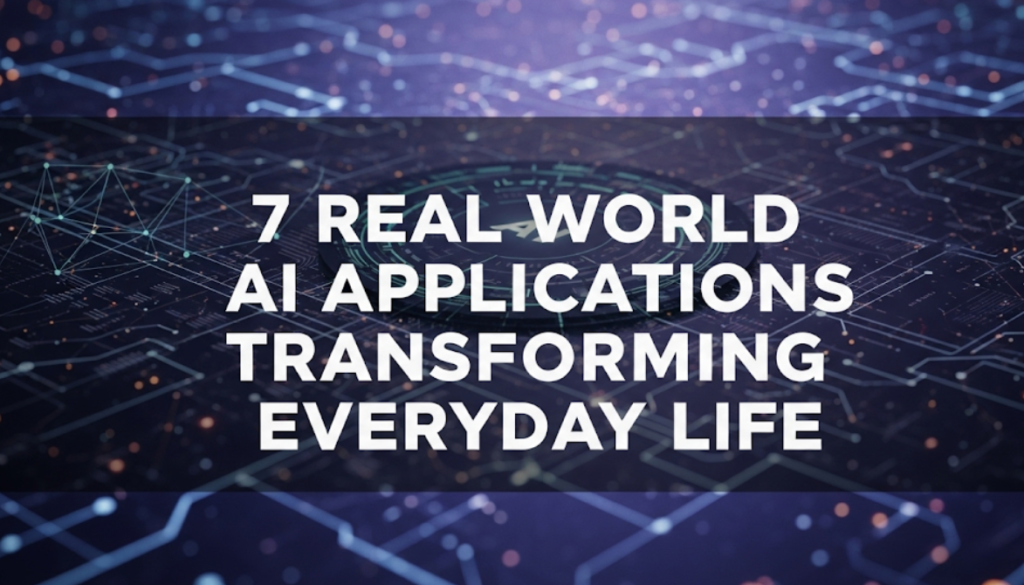Artificial intelligence is no longer science fiction. AI applications have crept into our lives, simplifying life, enhancing our safety, and making life more convenient. These smart technologies are working in the background to make your day better, whether you are waking up or going to sleep.
Chances are that you use AI applications dozens of times without realizing it. The voice assistant on your smartphone, your preferred streaming service, and even your car may be making use of artificial intelligence. The use of these tools has become so familiar that we tend to ignore them.
This article discusses seven of the most powerful AI applications that are transforming the way we live, work and play. You will find how these technologies affect your daily life and get to know what makes them so efficient. Whether you’re intrigued by the future or simply interested in knowing more about the technology you see around you, this guide is going to open your eyes to the AI revolution that is happening today.
Intelligent Voice Assistants: Your Digital Assistant
Voice assistants such as Siri, Alexa, and Google Assistant are some of the most commonly used AI solutions in households all over the world. These digital assistants have the ability to process natural language and respond to what you say with useful information or actions.
The Voice AI Assistant in Your Home
When you ask your smart speaker a question, it takes your speech and translates it into text. This text is then analyzed by the AI in order to determine what you want. Finally, it seeks the answer and talks to you in a natural voice.
These AI applications have the ability to manage your smart home appliances, play music, answer questions, give reminders and even order groceries. They are always studying what you like so they can improve their responses over time.
The Expanding Presence of Voice Technology
According to recent research, voice assistants are built into more than 4 billion devices. This figure continues to increase as more people find it incredibly convenient to use voice control in their daily activities.
People with disabilities have found voice AI to be of great use. It provides technology control without the use of their hands, making technology more accessible to everyone.
Voice Assistant Users Worldwide – Key Features
| Voice Assistant | Users | Key Features |
|---|---|---|
| Google Assistant | 500+ million | Smart home control, web search |
| Amazon Alexa | 100+ million | Shopping, skills, entertainment |
| Apple Siri | 500+ million | iOS integration, privacy focused |
Healthcare Artificial Intelligence: Transforming Medicine
The healthcare field is saving lives and improving patient outcomes every day with AI applications. These technologies assist physicians in diagnosing illnesses more quickly, designing personalized treatment methods, and even predicting illnesses before they escalate to serious situations.
Medical Imaging Intelligence
One of the most stunning AI applications in healthcare is medical image analysis. AI systems are now capable of detecting cancer with breathtaking precision in X-rays, MRIs, and CT scans. In some cases they detect things which human physicians could not detect.
As an example, AI can identify diabetic eye disease in photographs at Google. The technology is useful to physicians where there are no eye specialists and may save thousands of people from blindness.
Drug Discovery and Development
The development of new medicine is also quickening through AI applications. The conventional drug development process takes 10-15 years and costs billions of dollars. AI systems are able to study millions of chemical compounds in hours rather than years.
During the COVID-19 pandemic, AI allowed scientists to understand the virus and create vaccines in a much shorter time than before. This demonstrates the strength these technologies can possess in health emergencies.
Personal Health Monitoring
Fitness trackers and other wearables track your health around-the-clock with the help of AI. They can monitor irregular heartbeats, sleep patterns, and in some cases even tell you when you are likely to fall ill.
These artificial intelligence applications provide you and your physician with helpful information on how your health has been performing. This knowledge can be used to develop improved prevention methods and treatment procedures.
The Future of Transportation: Artificial Intelligence
The use of AI in transportation is changing the way we commute by making it safer, more efficient, and convenient. From ride-sharing apps to self-driving cars, artificial intelligence is driving us to a smarter future.
Ride-Sharing Revolution
Uber and Lyft apps apply sophisticated AI algorithms to match drivers with riders, suggest the most efficient routes, and estimate reasonable prices. These AI applications study traffic patterns, weather conditions, and demand levels to make split-second decisions.
The outcome is reduced waiting time, improved routes and efficient transportation for all. These systems handle millions of trips every single day and learn from each trip to make the next one better.
Self-Driving Technology
Autonomous vehicles are one of the most sophisticated uses of AI that has ever been developed. These are cars that operate without human drivers, powered by cameras, sensors and powerful computers.
Tesla, Waymo, and Cruise companies have logged millions of self-driving miles. Their artificial intelligence systems are able to identify traffic signals, navigate obstacles and make complex driving decisions on-the-fly.
Traffic Management Systems
Cities across the globe use AI applications to control traffic. These systems study traffic characteristics and modify signal timing to alleviate congestion and emissions.
Smart traffic lights can be programmed to extend green lights when they notice increased traffic or prioritize emergency vehicles. Cities that have implemented such AI solutions report 25% travel time reductions.
Entertainment Artificial Intelligence: Personalized Fun and Creativity
AI applications in entertainment have transformed the way we consume music, movies, and media. Entertainment has never been as personal as it is now, because these technologies understand what you like and suggest content you will really love.

Streaming Service Recommendations
Netflix, Spotify and YouTube utilize advanced AI software to recommend movies, shows, and music based on your preferences. These algorithms process your viewing history, ratings, and even the length of time spent viewing content.
The AI considers factors such as genre preferences, viewing time, and preferences of similar users. This provides a unique entertainment experience that improves the more you use it.
According to Netflix, 80 percent of content viewed is the result of AI recommendations. This indicates the efficiency of such systems in understanding what people want to watch.
Content Creation Tools
AI applications can now assist creators in making better content. Applications such as Adobe Sensei help with automatic editing of photos and videos. Music is composed with AI assistance, and text is written with AI help for grammar and style improvements.
Gaming Intelligence
Artificial intelligence applications in video games make opponents more realistic and challenging. Modern games rely on AI to generate limitless worlds, dynamically create narratives, and scale difficulty based on player abilities.
There are even games that rely on AI to moderate online behavior and make gaming communities safer and more enjoyable for everyone.
Financial Technology: Smart Money Management
Millions of people can now manage their money more securely and easily with the help of financial AI applications. These technologies help in detecting fraud, automating investments, and giving personalized financial guidance.
Fraud Detection and Security
Banks use AI applications to monitor transactions and identify suspicious behavior in real time. These systems can identify fraud patterns that would otherwise be beyond human ability to detect within reasonable timeframes.
When your credit card company calls to inquire about an unusual purchase, that is AI applications doing their job to keep your money safe. These systems analyze spending behaviors, location information, and purchase profiles to detect possible fraud.
Automated Investment Advice
Robo-advisors apply AI applications to automatically manage investment portfolios. They analyze market conditions, your financial objectives and risk tolerance to make investments.
Professional-level investment management has become accessible to the average person through companies such as Betterment and Wealthfront. Their AI systems rebalance portfolios and optimize taxes automatically.
Credit Scoring and Lending
AI is fundamentally changing the way creditworthiness is assessed by lenders. These systems don’t only look at credit scores; they analyze hundreds of data points to make lending decisions.
This helps offer loans to individuals with limited credit history while protecting lenders against risky borrowers. It is developing a more inclusive and equitable financial system.
Financial AI Applications Overview
| AI Application | Main Advantage | Users Affected |
|---|---|---|
| Fraud Detection | Enhanced security | Billions of bank customers |
| Robo-advisors | Automated investing | 1M+ investors |
| Credit Analysis | Fair lending | Millions of borrowers |
Smart Home Technology: Connected Living
AI applications in smart homes are transforming regular homes into intelligent homes. These technologies learn your habits and preferences to make your homes comfortable, efficient, and secure.
Climate Control Intelligence
Smart thermostats such as Nest employ artificial intelligence (AI) applications to understand your schedule and preferences. They automatically adjust temperature depending on whether you are at home, the weather outdoors, and your energy-saving goals.
These systems can save up to 23% of heating and cooling expenses while keeping you more comfortable. They also know when you are away and will adjust automatically to conserve energy.
Home Security Systems
AI-controlled security cameras can differentiate between family members, delivery people, and potential intruders. They minimize false alarms and improve response times by issuing specific alerts depending on what they observe.
Some systems can even detect unusual behavior patterns, such as someone lurking on your property or packages being stolen from your doorstep.
Smart Appliance Integration
Modern appliances apply AI applications to work more efficiently. Smart washing machines select the optimal cycle for your clothes. Refrigerators can recommend recipes and generate shopping lists automatically based on their contents.
These interconnected devices all work together to make your home seamlessly adapt to your lifestyle and preferences.
Education Technology: Personalized Learning
The use of AI in education is changing the process of learning and teaching. These devices offer personalized education, identify learning gaps, and bring education closer to learners in various locations around the globe.
Adaptive Learning Systems
Educational software based on AI can adapt to the learning pace and style of individual students. When you struggle with a concept, the system offers more practice and explanation. When you excel, it challenges you with advanced material.
Such AI applications encourage more effective learning on platforms such as Khan Academy and Coursera. The technology helps students where they need it most and offers targeted assistance. For those interested in exploring more about cutting-edge AI and technology innovations, there are numerous resources available that dive deeper into these transformative applications.
Language Learning Revolution
Duolingo and other apps are based on AI applications that deliver personalized language learning experiences. They monitor your progress, identify problem areas, and tailor lessons to help you learn more quickly.
These systems can even analyze your pronunciation and offer detailed feedback on how to improve your speaking skills. Voice recognition AI makes language learning more interactive and engaging.
Educational Content Creation
Educators use AI applications to create quizzes, grade assignments, and generate lesson plans. This saves time and enables teachers to focus on their preferred activity: teaching and mentoring students.
AI can also translate educational materials into multiple languages, making quality education accessible to students worldwide.
The Future of AI Applications
As AI technology continues to evolve, we can expect even more innovative applications to enter our lives. These systems will become easier to use, more helpful, and more embedded in everything we do.
The key to successful AI applications is technology that adds genuine value to human experiences. The best AI tools are unobtrusive and helpful rather than complex and problematic.
Privacy and security will continue to be important considerations for these technologies. The most successful AI applications will be those that earn user trust by keeping personal information safe and being transparent about their functionality.

Frequently Asked Questions About AI Applications
What are the most common AI applications people use daily?
Voice assistants, recommendation systems on streaming platforms, navigation apps, email spam filters, and fraud detection in banking are the most widespread AI applications. Most people interact with multiple AI systems without even realizing it.
Are AI applications safe to use?
Most mainstream AI applications from established companies are safe to use. However, you should be aware of privacy policies and data usage practices. Look for applications that encrypt your data and give you control over your information.
Do I need to be tech-savvy to use AI applications?
No, most consumer AI applications are designed to be user-friendly. They either operate in the background or have straightforward interfaces that anyone can use. Voice assistants, for example, only require you to speak naturally.
How do AI applications learn and improve?
AI applications learn through machine learning, which identifies patterns in large datasets. The more data they process, the better they become at making predictions and recommendations. They also improve through user feedback and continued use.
Will AI applications replace human jobs?
While AI applications automate certain tasks, they typically complement rather than completely replace human capabilities. New job categories continue to emerge with AI technology development, and much work still requires human creativity, empathy, and complex decision-making.
What’s the difference between AI and machine learning?
AI is the broader concept of machines performing tasks that typically require human intelligence. Machine learning is a subset of AI that focuses on systems that can learn and improve from data without being explicitly programmed for every scenario.
How much do AI applications cost?
Many AI applications are free to use, supported by advertising or data collection. Others require subscription fees or one-time purchases. Costs vary widely based on the complexity and target market of the application.
Will AI applications become more advanced?
Yes, AI technology continues to advance rapidly. Future applications will likely be more intuitive, context-aware, and capable of handling complex scenarios. However, development remains practical and grounded rather than reaching science fiction levels.
According to MIT Technology Review, the integration of AI into everyday applications will continue to accelerate, with particular growth expected in healthcare and autonomous systems.
Conclusion
AI applications have become an integral part of our daily lives, quietly working to make our days easier, safer, and more enjoyable. From healthcare and transportation to entertainment and education, these technologies are solving real-world problems and expanding human capabilities.
The seven categories discussed in this article represent just the beginning of the AI revolution. As these systems become more advanced and accessible, we’ll continue to see innovative applications that enhance human experiences.
The key to successful AI applications is that they’re designed to augment rather than replace human abilities. The best AI technologies feel natural and intuitive, seamlessly integrating into our lives without adding complexity or confusion.
Whether it’s a voice assistant helping you manage your smart home, Netflix suggesting your next binge-watch, or AI-assisted medical diagnosis, these applications are already improving your life. As technology continues to develop, we can expect even more exciting innovations that will transform how we live, work and play.
The future of AI applications is bright, with endless possibilities for creating innovations that serve human needs. The AI revolution is happening around us every day, and by staying informed and embracing helpful technologies, we can all benefit from its potential.
SEO Tags:
- AI applications daily life
- Artificial intelligence everyday use
- Smart technology home automation
- AI healthcare medical diagnosis
- Voice assistant smart home

